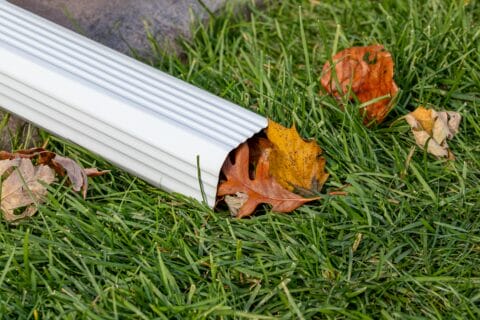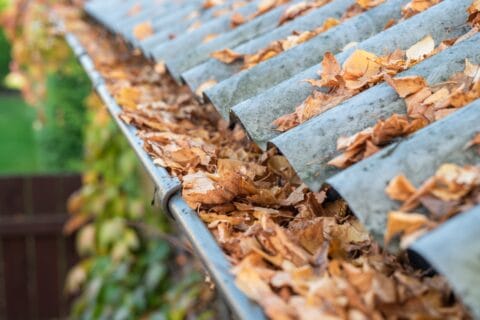Top Signs Your Gutters Need Cleaning (And What to Do About It)
 Revised by Bruce Hulse
Revised by Bruce Hulse
How Do I Know If My Gutters Need to Be Cleaned?
Gutters are essential to the health and structure of any home, yet they are often overlooked in routine maintenance. Responsible for directing rainwater away from your home, gutters play a vital role in protecting your roof, siding, foundation, and landscaping. When neglected, they become clogged with leaves, twigs, and organic debris, which can lead to costly and sometimes dangerous damage. This guide will help you understand why gutters are critical, how to recognize signs they need cleaning, and when to call in professionals. Maintaining a proactive gutter care routine can save you thousands in future repair costs and preserve the integrity of your home.
Why Gutters Are Critical to Your Home’s Function
Far more than a cosmetic architectural detail, gutters serve as your home’s first line of defense against water damage. By collecting runoff from the roof and channeling it safely away from the house, they prevent erosion, foundation cracks, moisture buildup, and basement leaks. Proper drainage also helps to preserve your lawn, gardens, and driveway from pooling water or ice. Without functional gutters, even a short bout of heavy rain can lead to lasting damage.
Gutters are particularly important in climates that experience snowmelt and heavy spring or fall rains. During these seasons, the amount of water a home must divert can increase dramatically. Without a properly functioning gutter system, water can penetrate vulnerable areas of your home’s exterior, increasing the risk of rot, insect infestation, and costly structural problems. A clean, unobstructed gutter system acts as a buffer between your roof and the elements, playing a crucial role in year-round home protection.
Signs Your Gutters Need Cleaning
Recognizing the early signs of gutter problems can prevent larger issues down the line. If you know what to look for, you can take swift action and avoid moisture intrusion or foundation damage. Below is a checklist of the most common symptoms that indicate your gutters may be blocked:
Gutter Cleaning Warning Checklist
| Indicator | What It Means |
| Plant growth inside gutters | Organic debris has built up and created soil-like conditions |
| Water spilling over edges | Gutters are clogged and unable to channel water through the downspouts |
| Sagging or detaching gutters | Excess weight from debris or standing water is stressing the system |
| Stains or mildew on walls | Overflowing water is seeping into siding or behind the fascia |
| Animals or pests near the roofline | Gutters may be providing nesting grounds due to clogged, damp environments |
| Slippery or icy walkways | Overflowing gutters are causing water to collect and freeze around the home |
| Foul odours | Decomposing organic matter is trapped in the gutter, possibly with standing water |
Each of these signs is a signal that water is not draining correctly from your roof. Left unchecked, these issues can escalate into structural damage, landscape erosion, or hazardous conditions for anyone walking near your home. Observing these symptoms early allows homeowners to take simple corrective actions before more invasive and expensive work is required.
Why Ignoring Gutter Issues Can Be Costly
Blocked gutters can cause more than inconvenience. The risk of water seeping into the foundation, damaging insulation, or rotting fascia boards increases when gutters are left clogged for long periods. During the winter, ice dams can form, causing water to back up under shingles and leak into the attic. Brickwork, paint, and wooden elements of your home are also vulnerable to water damage from chronic overflow. Preventing these issues with routine cleaning is far more cost-effective than repairing damage later.
Neglect can also shorten the lifespan of your gutter system itself. Materials can rust, seams may split, and brackets can weaken under the strain of excess debris and trapped water. These issues, once compounded, can lead to the need for full gutter replacement. In addition to the financial cost, repairs can also be disruptive and time-consuming, especially when paired with roofing or siding work triggered by delayed maintenance.
How Often Should You Clean Your Gutters?
Cleaning frequency depends on your environment. A general rule is to clean gutters at least twice a year; once in late spring and again in the fall. However, homes with heavy tree cover, pine needles, or heavy rainfall may require quarterly cleaning. If any of the warning signs above are present, cleaning should happen immediately regardless of the season.
For example, homes surrounded by mature deciduous trees will experience leaf buildup in autumn, while coniferous trees shed needles year-round. In urban environments, debris from rooftops and nearby construction can also clog gutters more quickly than anticipated. Monitoring your gutters seasonally helps identify these patterns and adjust your cleaning schedule accordingly. Some homeowners even opt for monthly visual checks, especially during peak seasons, to ensure systems are operating properly.
Can Pests Be a Sign of Gutter Problems?
Yes. Birds, squirrels, and insects like mosquitoes are often drawn to clogged gutters that provide shelter and moisture. Nesting materials further clog the gutters, while pests can damage roofing or create entry points into your attic. Regular maintenance and adding gutter guards can significantly reduce these risks.
Rodents and raccoons can also access the roof via overgrown gutters, creating issues that extend beyond drainage. Pests can chew through fascia boards, insulation, or even wiring, resulting in electrical hazards and extensive damage. Preventing pest infestations starts with removing the organic matter that makes gutters attractive in the first place. Clean gutters not only preserve your structure but help maintain a healthier living environment.
What to Do When You Spot Water Overflow
Water spilling over the sides of your gutters during a storm is one of the most visible signs they are blocked. First, check downspouts for clogs and inspect the gutters for any visible buildup. If the issue persists, a professional inspection is recommended to ensure there’s no damage to hidden components like hangers or fascia.
It’s also important to check that gutters are properly sloped. Poor pitch can cause water to pool and spill, even if gutters are clear. Ensuring the slope is around 1/4 inch for every 10 feet of gutter can help water flow efficiently toward the downspout. Professional services often include this adjustment as part of their cleaning package.
When to Consider Professional Gutter Cleaning
While DIY gutter cleaning is possible for single-storey homes, many homeowners benefit from hiring professionals, especially for taller or complex rooflines. Professional services include not only thorough debris removal but also inspections for leaks, wear, and minor damage. If you’re unsure whether your gutters are due for cleaning, a professional can provide a quick, risk-free assessment.
Professionals also bring safety advantages. Falls from ladders are among the most common household injuries. Using trained technicians with proper tools, harnesses, and safety procedures helps avoid serious accidents. Additionally, professionals may use specialized tools such as high-powered vacuums, gutter scoops, or flush systems to ensure a complete and mess-free result.
Conclusion: Protect Your Home with Preventative Maintenance
Neglecting gutter maintenance can lead to extensive and expensive home repairs. By watching for the signs of clogged gutters and scheduling regular cleanings, you can avoid many of the most common water-related issues that affect residential properties.
A proactive maintenance routine pays off in the form of a drier, healthier, and more secure home. Whether you perform cleanings yourself or hire experts, the important part is making gutter care a consistent habit.
For expert inspections and safe, effective cleaning tailored to the unique needs of your home, Clear Ottawa Windows offers professional gutter services to help keep your system flowing and your home protected year-round.


